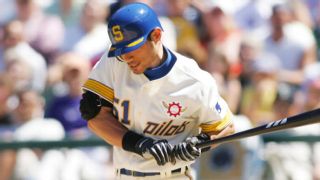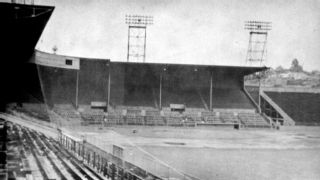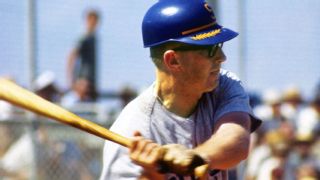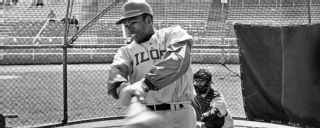SEATTLE -- The Seattle Pilots had an official theme song that included the lyrics: "You brought the majors to the evergreen Northwest; now, go, go you Pilots, you're going to be the best!"
Sadly, those lyrics should have been: "Now go, go you Pilots, you're going to be the Milwaukee Brewers (not that you're ever going to be very good there, either)."
As part of a four-team expansion that also saw the debuts of the Montreal Expos, Kansas City Royals and San Diego Padres, the Pilots began in Seattle in 1969. But just a year later they were gone, relocated to Milwaukee after going bankrupt and being bought by Bud Selig. Nearly a half-century later, little physically remains here from that season. The Pilots' home of Sicks' Stadium was torn down decades ago, and a Lowe's home improvement store now stands on the site. Inside the store is a replica of the departed ballpark's home plate and markings where the bases and mound once were.
"You go back a couple generations in baseball history and we had professional baseball from 1901 to 1969, through two world wars and a depression, and then -- poof! -- it's gone," Seattle sports historian David Eskenazi said. "The first year we didn't have pro baseball was 1970."
The Pilots might be remembered even less had it not been for the finest baseball book ever written: "Ball Four," Jim Bouton's diary of that 1969 season. Bouton wrote in his Opening Day entry after beating the Angels 4-3, "Already we're better than the Mets."
The Pilots did not remain so.

The Mets went on to win their first World Series that year, but Seattle went 64-98 and finished last in the six-team AL West.
The aptly named Sicks' Stadium was a tiny and old minor league ballpark with plumbing issues that resulted in players sometimes taking cold showers or just going home without showering. Perhaps conditions would have been better had the Lowe's been around in 1969.
Those Pilots drew only 677,944 fans, though that still was more than the Phillies, White Sox, Padres or Indians drew that year (the major league average was 1,134,569). They drew 14,993 for the April 11 home opener, a 7-0 win over the White Sox, but three days later a mere 3,611 watched the Pilots lose to the Royals. Only 1,954 fans showed for another April game. I was there Aug. 22 for Tommy Harper Night, held when Harper stole his 60th and 61st bases of the year, yet it was of so little interest it was attended by just 6,719 fans besides me.
"I don't think this is a town that will ever draw 25,000 or 30,000 regularly," Bouton wrote. "It's a town much more concerned with culture than athletics." (This has changed, as all those Seahawks No. 12 jerseys document.)

Low attendance and a poor stadium -- workers were still nailing and painting the bleachers of the renovated Triple-A park the day of the home opener -- were not the only issues. The Seattle owners, Dewey and Max Soriano, were not rich enough to support the Pilots -- they needed to sell 47 percent of the team stock to former Cleveland Indians owner William Daley. Nor were there rich businessmen in the area to take over the franchise in that era -- Bill Gates and Paul Allen still were Seattle teenagers just learning the wonders of computers.
Before Microsoft, Amazon and Starbucks started here, Boeing was the main local company. It was about to begin staggering layoffs that would lead to an early '70s billboard that infamously read: "Will the last person leaving Seattle turn out the lights."
Maybe the Pilots inspired the sign.
One week before the 1970 season began and with the team's finances in ruins, the Pilots' fate was still so much up in the air that they sent their equipment truck from spring training in Arizona to Provo, Utah. There the drivers stopped and waited for word whether to continue to Seattle or veer northeast to Milwaukee. On March 31, eight days before the team's season opener, word was sent: Go to Wisconsin. The Pilots were moving to Milwaukee.
As the late Mike Hegan told me once, the day after the move to Milwaukee was announced, he and his teammates entered their spring training clubhouse and found their jerseys now had MILWAUKEE stitched across the chest rather than SEATTLE. "It's amazing how cold this business can be," Hegan said.

Seattleites still know all too well how cold it can be. In 2006, Howard Schultz, who turned Starbucks into a global phenomenon, sold the NBA's SuperSonics to a group of Oklahoma businessmen who moved the team to Oklahoma City in 2008.
Fortunately, the Pilots' legacy lives on in an important way beyond "Ball Four," the home plate at Lowe's and the occasional fan wearing a replica cap with the pilot-like scrambled egg design across the bill. Thanks to Washington Attorney General Slade Gorton and trial lawyer Bill Dwyer, the state successfully sued the American League over the Pilots' departure. The league agreed to give Seattle another expansion team in 1977: the Mariners.
Although after 39 seasons and not a single World Series appearance, Seattle is still wondering whether the Mariners will ever go, go to be the best.


